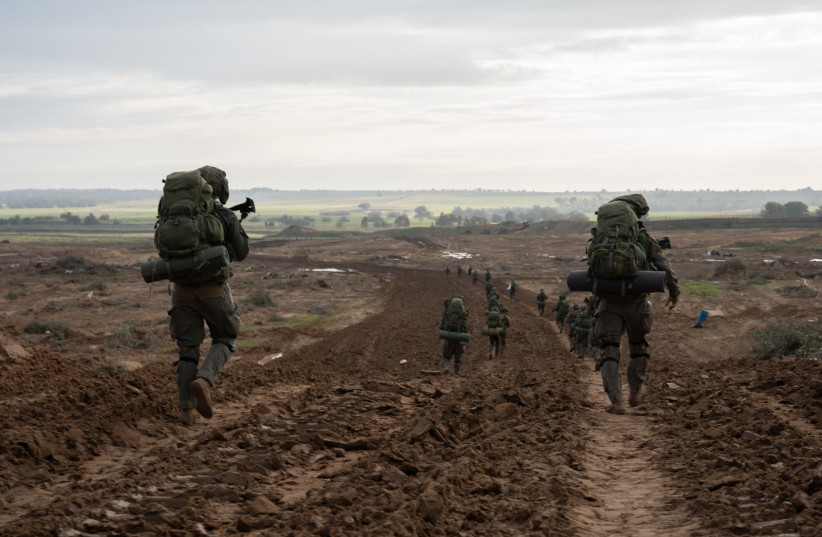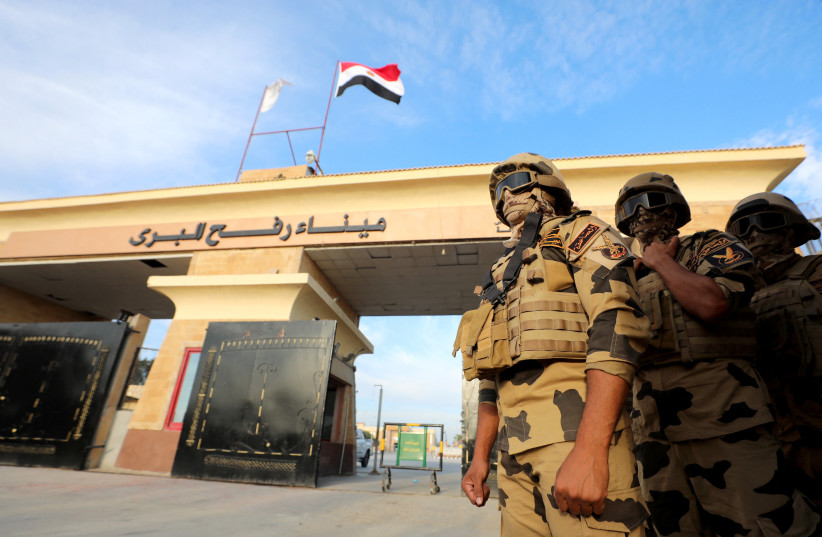Israel aims to control Philadelphi Corridor in Gaza, challenging Egypt’s position
As Israel’s war on Hamas in the Gaza Strip progresses, Israeli Prime Minister Benjamin Netanyahu said Saturday that the border between Gaza and Egypt must be “shut.” His comments indicated that at the end of the war, Israel intends to control all access to the Gaza Strip, putting its relationship with neighboring Egypt to the test.
The Israeli military is seeking to establish control over a narrow strip of land called the Philadelphi Corridor, which is approximately 13 kilometers (8 miles) long and located along Gaza’s southern border with Egypt.
In response, Egyptian politicians and officials quoted in the media have publicly rejected Israel’s desire to control this area despite some of them wanting to see Hamas removed from their border as much as Israel does.
Several Arab media outlets have reported that Egypt has begun to enforce new security measures on its side of the Philadelphi Corridor that will reduce pressure from Israel to do so. Those same reports said Egypt denied Israeli requests to control the area.
As part of the peace agreement between Israel and Egypt in 1979, the area was designated as a buffer zone that was monitored by Israeli forces. Coined the Philadelphi Corridor, Israel maintained control of it until its disengagement from the Gaza Strip in 2005. Egypt then deployed troops on its side of the border, with the Palestinian Authority (PA) taking over control of the Gaza side. In 2007, the Hamas terrorist organization violently overthrew the PA, seizing control of Gaza and the Philadelphi Corridor.

Corridor has proven critical to Hamas’s growth
Ever since, the narrow corridor has proven critical to Hamas’ efforts to gain strength. Its military capabilities have only grown over the years, as proven by the scale of its October 7 attack, which proved that Israel’s continual retaliatory military operations over the years had only made a small dent in the organization’s capabilities. Hamas’ force was fully exposed on October 7 as hundreds of its terrorists stormed the border with Israel using a wide arsenal of weapons.
As the Israeli military continues to operate in the south of Gaza, Netanyahu has repeatedly emphasized the importance of the Philadelphi Corridor.
“Clearly, we will not conclude the war without making sure this breach is closed shut,” he said at a press conference from the military headquarters in Tel Aviv over the weekend. “Otherwise, we will have destroyed Hamas, taken care of demilitarizing Gaza, and afterward, weapons and other lethal means will gradually enter through this southern breach.”
Despite its small size, the corridor is critical to Egypt, Israel, and Gaza. Its importance exceeds its miniscule proportion. Netanyahu was careful not to go into detail on how Israel intends to control the area, likely considering the sensitivity of the matter.
According to Prof. Eitan Shamir, director of the Begin-Sadat Center for Strategic Studies, a substantial part of how Hamas gained strength was through underground tunnels that cross the Philadelphi route.
“Most of the time, Egypt turned a blind eye,” Shamir told The Media Line. “Sometimes it was high-level officials who knew of this, sometimes it was through corruption and bribery of the operative levels on the ground.”
Both Israel and Egypt have operated against Hamas tunnels
According to Dr. Haim Koren, Israel’s former ambassador to Egypt and a lecturer at Reichman University, there were instances in which weapons and missiles were smuggled through this path. “This is a concern for Israel and therefore it wants to control the corridor on the Gaza side in order to prevent similar occurrences from happening again,” he told The Media Line.
Hamas developed a complex tunnel infrastructure as part of its effort to circumvent a stringent blockade that both Egypt and Israel have imposed on the Gaza Strip since 2007. The terrorist organization used the tunnels to smuggle weapons and other means for its fight against Israel. One of Israel’s main goals in its current war against Hamas is to dismantle the tunnel network. It is a daunting task, which is further complicated by the fact that Hamas is still holding over 130 Israeli hostages who were kidnapped during the Oct. 7 attack. The organization is believed to be holding many of them in those tunnels, together with Hamas’ senior leadership that is in hiding underground.
Yet, it is important to note that Hamas likely used additional routes to smuggle in weapons and knowledge, not only through Egypt.
“This is not the only method Hamas relied on,” Koren explained, pointing out a possible path from the Red Sea to Jordan, which also borders Israel.
Throughout the years, both Israel and Egypt have been aware of the presence of the tunnels and operated against them. In 2015, Egyptian President Abdel Fattah el-Sisi claimed the Egyptian military destroyed most of Hamas’ tunnels that spanned from the Gaza Strip and into the Sinai Peninsula in Egypt.
“There were periods when Egypt made a serious effort to prevent smuggling and destroy the tunnels,” added Shamir.
When el-Sisi came to power after replacing Mohamed Morsi, an Islamist leader whose ideology was much closer to Hamas than el-Sisi’s, he changed Egypt’s foreign policy.
During el-Sisi’s tenure, relations between Egypt and Israel have greatly improved.
“He had a new outlook on Egyptian security, identifying new risks to Egypt that were not Israel,” said Koren. “These [risks] were Islamic terrorism and Hamas. This led to increased cooperation with Israel.”
As part of its attempts, Egypt tried flooding the tunnels with sewage and other methods, including reports of spraying toxic gas into them. But despite that effort, Hamas continued to progress and improve its capabilities.
“Egypt has been concerned with Hamas for a long time,” said Koren. “It does not want to see Palestinians entering Egypt; they see this as a risk. On the one hand, Egypt holds the traditional pan-Arab belief that views Israel as not belonging to the region, but on the other hand, it wants to see Israel destroy Hamas. This is why we see Egypt’s tricky behavior, because it has a dilemma.”
The Palestinian-Israeli conflict has long been at the core of any disagreements between the two countries. Egypt sees itself as the guardian of the Palestinian cause, sometimes putting it at loggerheads with Israel, especially in times of escalation in the Palestinian territories. Violent protests in front of the Israeli Embassy in Cairo have occurred on many occasions.
But behind the scenes, mutual interests continue to guarantee the relations between the two countries and will likely lead to cooperation regarding the Philadelphi Corridor.
“For Egypt, it will be convenient for Israel to control the corridor, even though publicly they may not admit it,” said Koren. “But it is not in Israel’s interest to sit there for years.”

Parties could agree to a multinational force to control the corridor
Koren suggested a multinational force led by the US, with Egyptian, Saudi, Qatari and Emirati participation, which will control the corridor area after the Israeli military withdraws from there.
“With the addition of a Palestinian representative, this solution could be acceptable to all of the sides,” said Koren. “It removes Hamas and Israel from presence there.”
For now, this solution seems distant. As Netanyahu and Israeli military chief of the general staff, Lt. Gen. Herzi Halevi, vow that the war on Hamas is far from over, Israel will need to carefully consider how it operates in that sensitive border area.
“Control of the corridor is critical to prevent the strengthening of Hamas, and lacking the presence of a suitable alternative, Israel will have to be there for an indefinite period,” said Shamir. “It is possible that Egypt would quietly agree to cooperation with Israel, without publicly giving its blessing. This is not impossible—perhaps with American pressure and incentives.”
All the while, Egypt is also seeking to solidify its position as a mediator between Hamas and Israel. This position could help in facilitating a hostage release deal in the future. It could also further cement relations between the two countries, at the expense of Hamas.





Comments are closed.